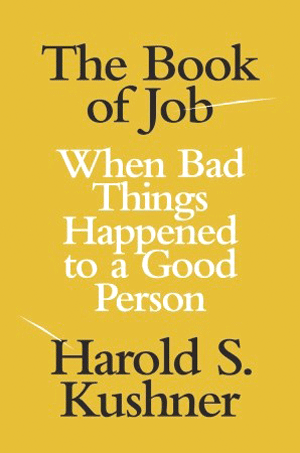Reviewed by NEAL GENDLER
Playing off the title that catapulted him to fame, Rabbi Harold Kushner has produced the book he wanted to write decades ago — one that wrestles with the existence of evil and suffering in the world of a just, loving God.
Who better personifies that problem than Job? A righteous, charitable man, neither he nor his friends can identify a reason he should be punished.
Kushner calls Job “probably the most challenging book in the entire Bible.” One reason is that a string of middle chapters is unclear. Another, perhaps larger, is that it grapples with the problem troubling Jews for 2,500 years, since Babylon destroyed the first Temple: “The certainty that God knows what He is doing and our refusal to believe that our misfortune could possibly be the will of a righteous God.”
Kushner’s first book grew from his son’s illness and death at age 14. Now, he explains how Job tries to reconcile belief in an all-powerful, all-just God after the death of his wife and children, loss of all his considerable property and his affliction with painful illness.

Kushner says Job is two stories, one “a simple folktale of faith maintained and rewarded” at the beginning and end. But the essence is the majority in the middle, “the Poem of Job, a much later, more-complicated work.” It shows Job as “not necessarily steadfast” in belief, questioning God’s compassion and mercy, repeatedly challenging God’s fairness.
Kushner calls the poem “one of the most sublime creations in all of biblical literature.” It also is “a no-holds-barred argument about God’s role in the world, the likes of which we find nowhere else in the Bible.”
Kushner’s book is brief, in the small size of the Schocken-Nextbook series on Jewish subjects. Because he aims to provide a guide through the biblical book’s “linguistic and theological challenges,” Kushner focuses on what he considers “the key verses in every chapter,” using the Jewish Publication Society modern translation — with which he occasionally disagrees.
Kushner’s book is easy to read and very interesting, but to understand his discussion, I needed complete context, reading all of each corresponding chapter in the JPS Tanakh. Kushner points out likely divergence from the original — sometimes from scribal errors, sometimes from scribes softening language they considered blasphemous.
The poem starts as a conversation among Job and three friends who come to console him. They try to tell him that all will be well, but he’s not comforted. They argue, and eventually the friends, who first say Job is sinless, come to insist that he must have committed some unknown or hidden sin. Job challenges God to tell him of what he’s accused.
Humans are “meaning-makers, constantly trying to understand our world in terms of cause and effect,” Kushner says. “We desperately want to believe that… things don’t just happen, they happen for a reason,” and that the world is fair and people get what they deserve. He rejects notions that everything that happens is for the better, or is part of God’s plan. Would a good, just God allow suffering?
Job also challenges God on moral grounds, using “the Torah’s law of justice, designed to protect the innocent person wrongly accused, against God Himself,” Kushner says.
After a harsh, indirect answer from the Almighty, Job repudiates his doubt and anger. Kushner’s own answer is that God is indeed all-powerful, kind and fair, but has chosen to limit His power in two areas: nature and free choice.
Nature, he says, is neither good nor evil, it just acts according to its own laws, which sometimes bring disaster. Free choice means some people will choose evil. What the Holy One does, Kushner says, is give us compassion and the power to conclude even after terrible misfortune that life still is worth living.
“God’s world is not perfect, because ‘perfect’ means ‘finished,’” Kushner says. “God’s creative process is still going on.”
***
Neal Gendler is a Minneapolis writer and editor.
(American Jewish World, 10.12.12)



















